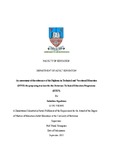An assessment of the relevance of the Diploma in Technical and Vocational Education (DTVE) for preparing teachers for the Botswana Technical Education Programme (BTEP)
Date
2016-07-14Author
Kgaditswe, Ookeditse
Link
UnpublishedType
Masters Thesis/DissertationMetadata
Show full item recordAbstract
The Botswana Technical Education Programme (BTEP) was introduced in the Botswana educational system as a policy that would align technical and vocational education graduate skills with the needs of industry. Some past studies had revealed that there was a skills mismatch between what graduates were taught and the demands of industry. When BTEP was introduced it came with constructivist learner-centred teaching methodologies which were new in the technical and vocational system. The Diploma in Technical and Vocational Education (DTVE) graduates are trained specifically to teach BTEP.
This study, therefore, investigated the relevance of the DTVE programme in training teachers trained at Francistown College of Technical and Vocational Education (FCTVE) for teaching BTEP. This phenomenological study was guided by Donald Kirkpatrick (1994) model known as Assessing Training Effectiveness, which is a model mainly used for curriculum evaluation.
Through in-depth individual interviews with DTVE graduate teachers and Heads of Departments (HoDs), this qualitative study sought to determine the teachers’ ability to cope with the demands of the teaching environment that was introduced to handle BTEP. The interviews tried to find out the perceptions of the HoDs and teachers about the relevance of their programme. Classroom observations were also carried out on some of the teachers who were interviewed on order to find out what was happening on the ground.
Though the findings indicate that there were a lot of successes in the way FCTVE has handled training, there were also some challenges which cannot be ignored. Some of the outstanding achievements were that FCTVE was doing a good job on training the teachers to use learner-centred methods. The findings also revealed that the graduate teachers were team workers and respected their supervisors and colleagues as well as the learners they teach. The FCTVE graduate teachers made detailed preparations for their work and followed the schedule in whatever they were doing.
However, some of the challenges facing the graduate teachers were that they seem to be lacking in the principles of Guidance and Counselling, adult education, mixed ability teaching and portfolio assessment. These skills have been imparted to them but it seems that it was more theoretical than practical.
In this study recommendations such as the review of the DTVE and BTEP programmes to include other methods of teaching to help teachers have a variety of teaching methods to choose from, were made. Based on the findings of the study, the areas that need further exploration were also put forward.

